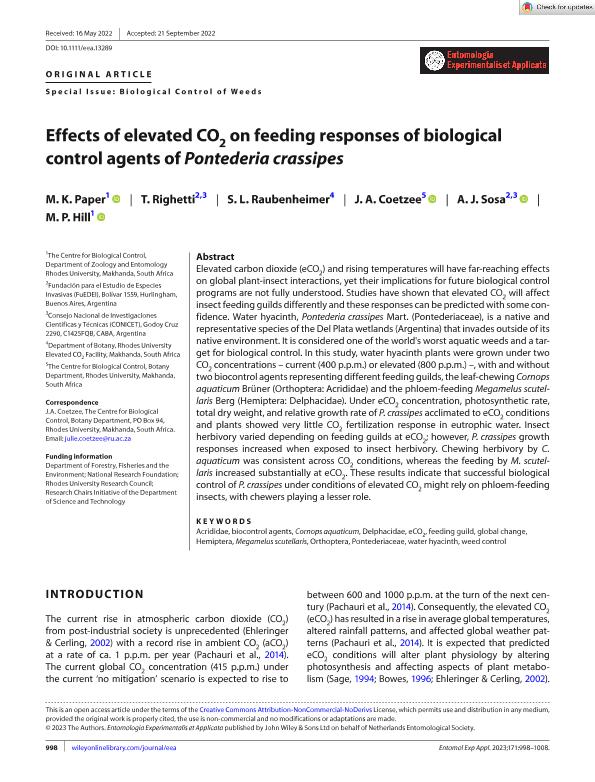Artículo
Effects of elevated CO2 on feeding responses of biological control agents of Pontederia crassipes
Paper, M.K.; Righetti, Tomás ; Raubenheimer, S.L.; Coetzee, J.A.; Sosa, Alejandro Joaquín
; Raubenheimer, S.L.; Coetzee, J.A.; Sosa, Alejandro Joaquín ; Hill, M.P.
; Hill, M.P.
 ; Raubenheimer, S.L.; Coetzee, J.A.; Sosa, Alejandro Joaquín
; Raubenheimer, S.L.; Coetzee, J.A.; Sosa, Alejandro Joaquín ; Hill, M.P.
; Hill, M.P.
Fecha de publicación:
12/2023
Editorial:
Wiley Blackwell Publishing, Inc
Revista:
Entomologia Experimentalis et Applicata
ISSN:
0013-8703
Idioma:
Inglés
Tipo de recurso:
Artículo publicado
Clasificación temática:
Resumen
Elevated carbon dioxide (eCO2) and rising temperatures will have far-reaching effects on global plant-insect interactions, yet their implications for future biological control programs are not fully understood. Studies have shown that elevated CO2 will affect insect feeding guilds differently and these responses can be predicted with some confidence. Water hyacinth, Pontederia crassipes Mart. (Pontederiaceae), is a native and representative species of the Del Plata wetlands (Argentina) that invades outside of its native environment. It is considered one of the world's worst aquatic weeds and a target for biological control. In this study, water hyacinth plants were grown under two CO2 concentrations – current (400 p.p.m.) or elevated (800 p.p.m.) –, with and without two biocontrol agents representing different feeding guilds, the leaf-chewing Cornops aquaticum Brüner (Orthoptera: Acrididae) and the phloem-feeding Megamelus scutellaris Berg (Hemiptera: Delphacidae). Under eCO2 concentration, photosynthetic rate, total dry weight, and relative growth rate of P. crassipes acclimated to eCO2 conditions and plants showed very little CO2 fertilization response in eutrophic water. Insect herbivory varied depending on feeding guilds at eCO2; however, P. crassipes growth responses increased when exposed to insect herbivory. Chewing herbivory by C. aquaticum was consistent across CO2 conditions, whereas the feeding by M. scutellaris increased substantially at eCO2. These results indicate that successful biological control of P. crassipes under conditions of elevated CO2 might rely on phloem-feeding insects, with chewers playing a lesser role.
Archivos asociados
Licencia
Identificadores
Colecciones
Articulos(SEDE CENTRAL)
Articulos de SEDE CENTRAL
Articulos de SEDE CENTRAL
Citación
Paper, M.K.; Righetti, Tomás; Raubenheimer, S.L.; Coetzee, J.A.; Sosa, Alejandro Joaquín; et al.; Effects of elevated CO2 on feeding responses of biological control agents of Pontederia crassipes; Wiley Blackwell Publishing, Inc; Entomologia Experimentalis et Applicata; 171; 12; 12-2023; 998-1008
Compartir
Altmétricas



